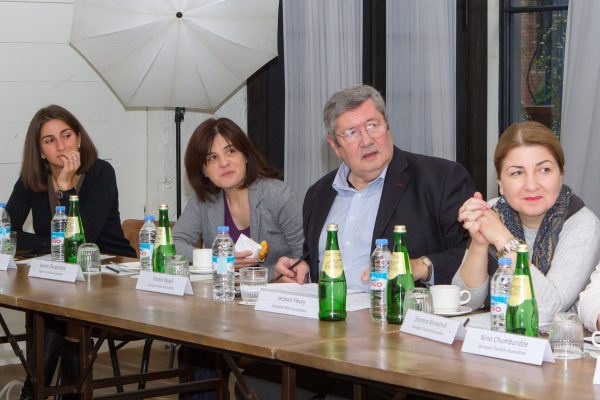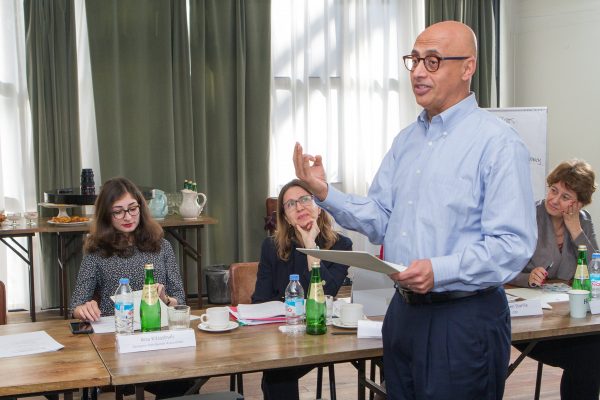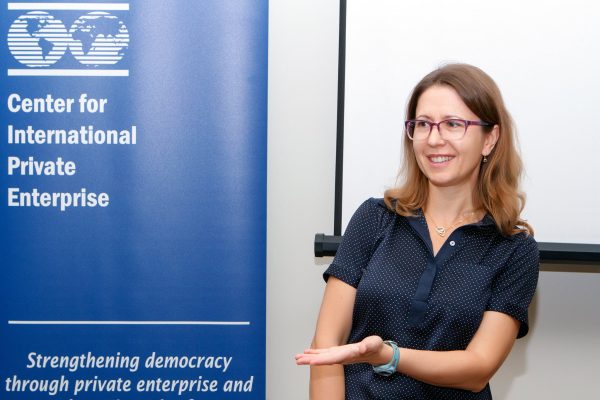By many measures, Georgia has emerged as Eurasia’s best transitioning democracy and market economy. Freedom House’s Nations in Transit report has ranked the country as one of the strongest democracies in the region for five years in a row. The World Bank rated Georgia sixth in the world on its 2019 Ease of Doing Business index, up from 11th in 2010. These advancements are due to the ambitious package of reforms passed by the Georgian government over the past decade to harmonize legislation with European standards, as the country has worked toward greater integration with the European Union. Many cumbersome and complex regulations have been simplified or abolished, making it easy to start a business and engage in trade. Of all 190 countries assessed in the World Bank’s report, Georgia ranked first for requiring the fewest procedures to start a business and register property.
However, Georgia still faces many challenges. Not all citizens feel the benefits of these fast-moving economic reforms, and the country is struggling with the implementation of its ambitious policies. Many small and medium-sized enterprises (SMEs) face difficulties accessing finance and business support services, as well as navigating the newly-reformed legal and regulatory framework. As a result, new firms have been slow to develop, and existing businesses struggle to grow and add jobs—especially in the rural provinces outside the capital.

Business associations, now more than ever, must play a crucial role in bringing the small business community into the reform process for the country to produce inclusive economic growth. Associations can voice the needs of their business members and step in to provide much-needed business development services that the government is often not able to deliver, particularly in rural areas.
However, Georgian companies are not joining associations. This is because voluntary member-based associations are a new concept in this post-Soviet country. Most businesses are not familiar with this type of organization and the important role they can play in supporting their growth. While many business associations have sprouted in Georgia in the past three to five years, they need to work hard to reach out to businesses across the country. At the same time, they must show concrete value to potential members and demonstrate the ability to address their problems.

To strengthen these new business associations, CIPE launched a multi-phase initiative in mid-2017 titled “Strong Associations—Strong Advocates.” Through guidance and one-on-one mentorship, CIPE aims to develop the associations’ internal capacity to serve SMEs. Over the past year and a half, CIPE experts have supported a range of associations across various sectors of the economy in designing services, building communication and public relations skills, and raising awareness of the benefits of joining associations. Participants have also learned how to run a successful organization by focusing on strategic planning and better governance and management. Building a strong organizational foundation is crucial for associations to achieve longer-term goals of inclusive economic growth.

Following are some key achievements from the project’s first phase, which generated positive momentum for the second phase to build on:
- The Georgian Distributors Business Association (GDBA) designed a training program for members. With support from CIPE and U.S.-based association expert Hilarie Hoting, GDBA also created a marketing booklet outlining the association’s mission and benefits, developed a new mission statement, and drafted its first-ever job descriptions, ultimately creating operational efficiency for the association.
- The Georgian Ecotourism Association conducted a survey of its membership base and used the results to identify nine specific areas of concern for its members and developed plans for new member-focused services. The association also redesigned its membership structure, introducing tiered membership, organized five membership recruitment events across five different regions of Georgia, and developed a new marketing brochure and improved its website.
- The Georgian Employers Association (GEA) conducted a survey of its members across the country on human resources and by June 2018 was able to develop two training modules for SMEs on hiring techniques and evaluation of personnel.
- The Georgian Tourism Association (GTA) organized two strategic retreats for members and developed its first-ever strategic plan with support from CIPE and U.S.-based association expert Susan Sarfati. The association crafted a mission and vision statement, identified strategic priorities, and developed new association information materials to attract new members.
- The Georgian Wine Association (GWA) completed a thorough update and rebranding of its website with CIPE’s support. The website was re-designed to attract new members, raise awareness of GWA activities, and inform visitors about recent projects. GWA has used the new website to promote and raise awareness of events such as the association’s Qveri and Saperavi wine competitions, which has led to greater media coverage for the association and new members.
- The Georgian Women Business Association (GWBA) completed a full rebranding of its public image and website, revised its mission and bylaws, and began work on a new membership structure. The association also launched a new website featuring the new branding, mission, and bylaws.
- The Gudauri Tourism Association created a database of members and produced a 2018 work plan, which was the first such plan within the association. With CIPE support, the association was also able to create a new membership application form, brochures, a Facebook page, and content for its new website. Since the end of the first phase of CIPE’s project, GTA has created six thematic committees based on their work plan, including groups for educational tourism, a hotel committee, and a wellness committee. This has improved membership numbers and engagement.
- The Wine Tourism Association (WTA) revised its bylaws, and with CIPE’s help WTA’s leaders reassessed the association governance structure and processes. WTA now works with Maestro TV and Post TV to produce television shows about their members and about wine tourism in Georgia.
- The Georgian Farmers Association (GFA) designed a new tiered membership structure, focusing on introducing membership dues for the first time. GFA held a series of focus groups for members to determine the price and benefits of different membership levels. More recently, GFA has used the focus group results to develop service packages, which include free and fee-based services. GFA plans to implement the new membership structure later this year, after completing an additional round of surveys, focus groups, and interviews with members.
When CIPE launches the second phase of the project in May 2019, it will expand the group of participating business associations from nine to 15. As CIPE increases the number of associations it works with, it will increase the potential to support more SMEs and generate greater economic growth throughout Georgia.
Liza Lenz Jedwab is CIPE’s Assistant Program Officer for Eurasia, focusing on the Caucasus region.
Monica Nates is a Program Assistant at CIPE.
Published Date: February 06, 2019
